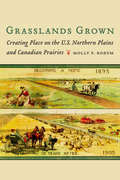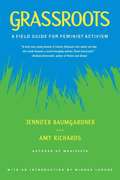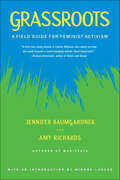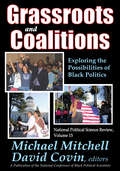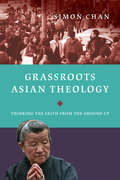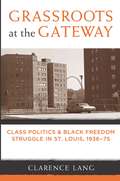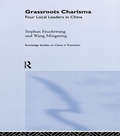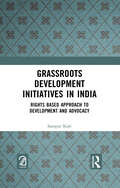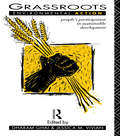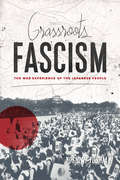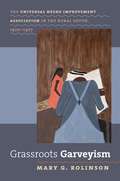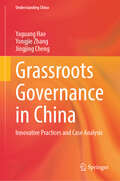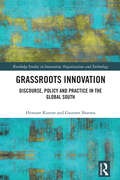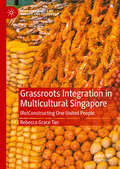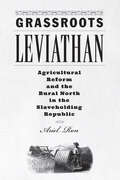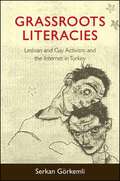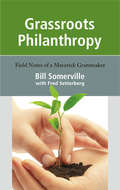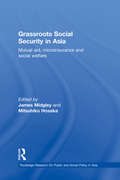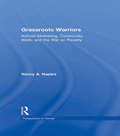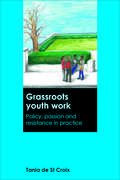- Table View
- List View
Grasses of a Thousand Colors
by Wallace ShawnAn updated and revised edition of Wallace Shawn's most outlandish work to date.This poetic epic about a scientist, his wife, and his two mistresses as they fend for their lives in a world savagely close to extinction, raises issues of redemption, forgiveness, and responsibility. Grasses of a Thousand Colors is a troubling, erotic adventure that received high critical praise for its first New York City revival in 2013, starring Shawn.Wallace Shawn is a noted actor and writer. His often politically charged and controversial plays include The Fever, Aunt Dan and Lemon, Marie and Bruce, and The Designated Mourner.
Grasses of a Thousand Colors
by Wallace Shawn"Among living American writers for the theater today, Wallace Shawn is among the most respected by his peers and championed by serious critics."--Don Shewey"The play is bound to delve further into the world that Shawn began to explore so precipitously nearly thirty-five years ago: one filled with ideas, wherein the action is the domestication of cruelty."--The New YorkerGrasses of a Thousand Colors is a poetic epic that tells the story of a scientist (Ben), his wife (Cerise), and his two mistresses (Robin and Rose), as they fend for their lives in a world much like ours, yet one savagely close to extinction. Due to the scientific manipulation of the world's crops, a destructive system for which Ben is partly responsible, there is very little nourishment left to be had, except for those most privileged and connected. Despite the dying off of most of the world, these characters manage to survive, at times tasting the good life, admiring the beauties of nature, feasting on animalistic sex, and finding love. The play raises issues of redemption, forgiveness, and responsibility as it recounts a somewhat passionate, erotic adventure story.Wallace Shawn is the author of Our Late Night (winner of the OBIE Award for Best Play), Marie and Bruce, Aunt Dan and Lemon, The Designated Mourner, The Fever, and the screenplay for My Dinner with Andre, in which he starred. Grasses of a Thousand Colors, Shawn's first full-length play in ten years, will be produced in the United Kingdom and the United States in 2009. Shawn is a well-known film and television actor. He resides in New York City.
Grasslands Grown: Creating Place on the U.S. Northern Plains and Canadian Prairies
by Molly P. RozumIn Grasslands Grown Molly P. Rozum explores the two related concepts of regional identity and sense of place by examining a single North American ecological region: the U.S. Great Plains and the Canadian Prairie Provinces. All or parts of modern-day Alberta, Montana, Saskatchewan, North Dakota, South Dakota, and Manitoba form the center of this transnational region. As children, the first postconquest generation of northern grasslands residents worked, played, and traveled with domestic and wild animals, which introduced them to ecology and shaped sense-of-place rhythms. As adults, members of this generation of settler society worked to adapt to the northern grasslands by practicing both agricultural diversification and environmental conservation. Rozum argues that environmental awareness, including its ecological and cultural aspects, is key to forming a sense of place and a regional identity. The two concepts overlap and reinforce each other: place is more local, ecological, and emotional-sensual, and region is more ideational, national, and geographic in tone. This captivating study examines the growth of place and regional identities as they took shape within generations and over the life cycle.
Grassroots: A Field Guide for Feminist Activism
by Jennifer Baumgardner Amy RichardsFrom the authors of Manifesta, an activism handbook that illustrates how to truly make the personal political. Grassroots is an activism handbook for social justice. Aimed at everyone from students to professionals, stay-at-home moms to artists, Grassroots answers the perennial question: What can I do? Whether you are concerned about the environment, human rights violations in Tibet, campus sexual assault policies, sweatshop labor, gay marriage, or the ongoing repercussions from 9-11, Jennifer Baumgardner and Amy Richards believe that we all have something to offer in the fight against injustice. Based on the authors' own experiences, and the stories of both the large number of activists they work with as well as the countless everyday people they have encountered over the years, Grassroots encourages people to move beyond the "generic three" (check writing, calling congresspeople, and volunteering) and make a difference with clear guidelines and models for activism. The authors draw heavily on individual stories as examples, inspiring readers to recognize the tools right in front of them--be it the office copier or the family living room--in order to make change. Activism is accessible to all, and Grassroots shows how anyone, no matter how much or little time they have to offer, can create a world that more clearly reflects their values.
Grassroots: A Field Guide for Feminist Activism
by Jennifer Baumgardner Amy RichardsFrom the authors of Manifesta, an activism handbook that illustrates how to truly make the personal political.Grassroots is an activism handbook for social justice. Aimed at everyone from students to professionals, stay-at-home moms to artists, Grassroots answers the perennial question: What can I do? Whether you are concerned about the environment, human rights violations in Tibet, campus sexual assault policies, sweatshop labor, gay marriage, or the ongoing repercussions from 9-11, Jennifer Baumgardner and Amy Richards believe that we all have something to offer in the fight against injustice. Based on the authors' own experiences, and the stories of both the large number of activists they work with as well as the countless everyday people they have encountered over the years, Grassroots encourages people to move beyond the "generic three" (check writing, calling congresspeople, and volunteering) and make a difference with clear guidelines and models for activism. The authors draw heavily on individual stories as examples, inspiring readers to recognize the tools right in front of them--be it the office copier or the family living room--in order to make change. Activism is accessible to all, and Grassroots shows how anyone, no matter how much or little time they have to offer, can create a world that more clearly reflects their values.
Grassroots and Coalitions: Exploring the Possibilities of Black Politics (National Political Science Review Ser.)
by Michael Mitchell David CovinThe main focus of this volume is an exploration of the patterns of competition for political power at the state and local levels in American politics. This volume looks at institutionalized patterns of black political power as they have evolved in the aftermath of the civil rights movement in the 1960s.The editors argue that enough time has elapsed to warrant a new look at the circumstances in which black politics in America has played out. Chapters include an examination of the ability of black candidates to win statewide elections with crucial white support; an analysis of the impact of local political organizations in enhancing the chances of black candidates in winning local races; a look at the messages of black pastors regarding solidarity with the Latino community; and an investigation of the extent of the differences in the political participatory styles of poor blacks and poor whites.The editors note that changes have taken place as black American politics has confronted new complexities. A works-in-progress section explains how theories of racial violence can be used to analyze racial incidents in the United States. Other essays include reflections on blacks in Brazil and in urban American politics.
Grassroots Asian Theology: Thinking the Faith from the Ground Up
by Simon ChanGrassroots Asian Theology,Grassroots Asian Theology
Grassroots at the Gateway
by Clarence Lang"This is a theoretically sophisticated and thoroughly documented historical case study of the movements for African American liberation in St. Louis. Through detailed analysis of black working class mobilization from the depression years to the advent of Black Power, award-winning historian Clarence Lang describes how the advances made in earlier decades were undermined by a black middle class agenda that focused on the narrow aims of black capitalists and politicians. The book is a major contribution to our understanding of the black working class insurgency that underpinned the civil rights and Black Power campaigns of the twentieth century. " ---V. P. Franklin, University of California, Riverside "A major work of scholarship that will transform historical understanding of the pivotal role that class politics played in both civil rights and Black Power activism in the United States. Clarence Lang's insightful, engagingly written, and well-researched study will prove indispensable to scholars and students of postwar American history. " ---Peniel Joseph, Brandeis University Breaking new ground in the field of Black Freedom Studies,Grassroots at the Gatewayreveals how urban black working-class communities, cultures, and institutions propelled the major African American social movements in the period between the Great Depression and the end of the Great Society. Using the city of St. Louis in the border state of Missouri as a case study, author Clarence Lang undermines the notion that a unified "black community" engaged in the push for equality, justice, and respect. Instead, black social movements of the working class were distinct from---and at times in conflict with---those of the middle class. This richly researched book delves into African American oral histories, records of activist individuals and organizations, archives of the black advocacy press, and even the records of the St. Louis' economic power brokers whom local black freedom fighters challenged. Grassroots at the Gatewaycharts the development of this race-class divide, offering an uncommon reading of not only the civil rights movement but also the emergence and consolidation of a black working class. Clarence Lang is Assistant Professor in African American Studies and History at the University of Illinois at Urbana-Champaign. Photo courtesy Western Historical Manuscript Collection, University of Missouri, St. Louis
Grassroots Charisma: Four Local Leaders in China (Routledge Studies on China in Transition #Vol. 10)
by Stephan Feuchtwang Wang MingmingThis book relates the stories of four leaders under very different political regimes: Colonial, Nationalist and Communist. The authors compare Chinese notions of respect and inspiration with their equivalents in other religious and political histories of colonial and post-colonial modernity, thereby producing a thorough re-working of the idea of charisma. The result is an intriguing study of the relationship between religious and political authority in a changing world.
Grassroots Development Initiatives in India: Rights Based Approach to Development and Advocacy
by Sampat KaleThis book examines how the voluntary organisations engaged with development programmes work with the approach of conscientisation to empower Adivasis. Their work has been instrumental in making government machinery pro-poor by implementing development programmes with greater transparency and accountability. Conscientisation of Adivasis by voluntary organisations through their educative role has resulted in the advancement of their lives and the emergence of autonomous leadership. The study concludes that the ideological base of the founders of the organisations made the Adivasis independent and self-supportive for their development from their earlier status of servitude through initiating and accomplishing the task of conscientisation. This title is co-published with Aakar Books. Print editions not for sale in South Asia (India, Sri Lanka, Nepal, Bangladesh, Pakistan and Bhutan)
Grassroots Environmental Action: People's Participation in Sustainable Development
by Dharam Ghai Jessica M. VivianManaging resources sustainably on the local level is essential for achieving the global goal of sustainable development. The importance of people's participation for sustainable development has recently become increasingly acknowledged yet there is little understanding of the multiple dimensions that such participation involves. Grassroots Environmental Action questions the viability of traditional management systems. Case studies from Latin America, Asia and Africa focus on areas where local people are vigorous actors in the determination of their own future and that of their environment.
Grassroots Fascism: The War Experience of the Japanese People
by Yoshimi Yoshiaki Ethan MarkGrassroots Fascism profiles the Asia Pacific War (1941--1945) -- the most important though least understood experience of Japan's modern history -- through the lens of ordinary Japanese life. Moving deftly from the struggles of the home front to the occupied territories to the ravages of the front line, the book offers rare insight into popular experience from the war's troubled beginnings through Japan's disastrous defeat in 1945 and the new beginning it heralded.Yoshimi Yoshiaki mobilizes personal diaries, memoirs, and government documents to portray the ambivalent position of ordinary Japanese as both wartime victims and active participants. He also provides equally penetrating accounts of the war experience of Japan's imperial subjects, including Koreans and Taiwanese. This book challenges the idea that the Japanese operated as a passive, homogenous mass during the war -- a mere conduit for a military--imperial ideology imposed upon them by the political elite. Viewed from the bottom up, wartime Japan unfolds as a complex modern mass society, with a corresponding variety of popular roles and agendas. In chronicling the diversity of the Japanese social experience, Yoshimi's account elevates our understanding of Japan's war and "Japanese Fascism," and in its relation of World War II to the evolution -- and destruction -- of empire, it makes a fresh contribution to the global history of the war. Ethan Mark's translation supplements the Japanese original with explanatory annotations and an in-depth analytical introduction, drawing on personal interviews to situate the work within Japanese studies and global history.
Grassroots Fascism: The War Experience of the Japanese People (Weatherhead Books on Asia)
by Yoshiaki YoshimiGrassroots Fascism profiles the Asia Pacific War (1937–1945)—the most important though least understood experience of Japan's modern history—through the lens of ordinary Japanese life. Moving deftly from the struggles of the home front to the occupied territories to the ravages of the front line, the book offers rare insights into popular experiences from the war's troubled beginnings through Japan's disastrous defeat in 1945 and the new beginning it heralded.Yoshimi Yoshiaki mobilizes diaries, letters, memoirs, and government documents to portray the ambivalent position of ordinary Japanese as both wartime victims and active participants. He also provides penetrating accounts of the war experiences of Japan's minorities and imperial subjects, including Koreans and Taiwanese. His book challenges the idea that the Japanese people operated as a mere conduit for the military during the war, passively accepting an imperial ideology imposed upon them by the political elite. Viewed from the bottom up, wartime Japan unfolds as a complex modern mass society, with a corresponding variety of popular roles and agendas.In chronicling the diversity of wartime Japanese social experience, Yoshimi's account elevates our understanding of "Japanese Fascism." In its relation of World War II to the evolution—and destruction—of empire, it makes a fresh contribution to the global history of the war. Ethan Mark's translation supplements the Japanese original with explanatory notes and an in-depth introduction that situates the work within Japanese studies and global history.
Grassroots Garveyism
by Mary G. RolinsonThe black separatist movement led by Marcus Garvey has long been viewed as a phenomenon of African American organization in the urban North. But as Mary Rolinson demonstrates, the largest number of Universal Negro Improvement Association (UNIA) divisions and Garvey's most devoted and loyal followers were found in the southern Black Belt. Tracing the path of organizers from northern cities to Virginia, and then from the Upper to the Deep South, Rolinson remaps the movement to include this vital but overlooked region.Rolinson shows how Garvey's southern constituency sprang from cities, countryside churches, and sharecropper cabins. Southern Garveyites adopted pertinent elements of the movement's ideology and developed strategies for community self-defense and self-determination. These southern African Americans maintained a spiritual attachment to their African identities and developed a fiercely racial nationalism, building on the rhetoric and experiences of black organizers from the nineteenth-century South. Garveyism provided a common bond during the upheaval of the Great Migration, Rolinson contends, and even after the UNIA had all but disappeared in the South in the 1930s, the movement's tenets of race organization, unity, and pride continued to flourish in other forms of black protest for generations.
Grassroots Governance in China: Innovative Practices and Case Analysis (Understanding China)
by Yaguang Hao Yongjie Zhang Jingjing ChengThis book provides an in-depth empirical analysis of six core strategies in China's grassroots social governance. These strategies represent the essence of grassroots social governance in China, spanning community management, public services, conflict mediation, and mass participation. They embody the innovative spirit and pragmatic approach of the Chinese government in social governance. By empirically analyzing these strategies, the book unveils the unique advantages of China's grassroots social governance and its significance for global governance. It is an indispensable textbook, especially for courses on Chinese politics, social governance in China, and East Asian politics.
Grassroots Innovation: Discourse, Policy and Practice in the Global South (Routledge Studies in Innovation, Organizations and Technology)
by Gautam Sharma Hemant KumarThis book explores the process of grassroots innovation in the context of the Global South. It explains why these bottom-up solutions developed by common people are generated due to a lack of available or affordable technology to meet their needs and how they are included in the mainstream imagination of the economy by studying these innovations in India. It analyses the grassroots innovation process from idea generation to its implementation.Detailing both theoretical and practical dimensions of grassroots innovation, the book provides a holistic understanding of the phenomenon by tracing its history in the pre-independence discourse on development to the present-day policies for institutionalizing these innovations in the mainstream. It will provide the readers with a bottom-up commentary on innovation and development in the context of the Global South in general and India in particular. It adopts a qualitative research design with a wide range of data collected through interviews, participant observations, and field notes. The book contains seven chapters to describe the discourse, policy perspectives, and current practice of grassroots innovations in general.The interdisciplinary, timely book provides thoughtful analysis for scholars and upper-level students in the fields of technology and innovation management, development studies, and public management.
Grassroots Integration in Multicultural Singapore: (Re)Constructing One United People (Palgrave Politics of Identity and Citizenship Series)
by Rebecca Grace TanThis book studies the role that grassroots volunteers play in the integration and naturalization process in Singapore. With increasing migration, the topics of migrant integration and belonging are of perennial academic and public interest. However, much of the existing literature on the subject is largely focused on European and North American cases. By focusing on the single case of Singapore, this project provides a story of how a city-state grapples with the issue of managing increasing cultural diversity while seeking to maintain a cohesive identity. As a city, Singapore has many ubiquitous features of other urban centres for migration, such as a rapidly diversifying population and an economy that is heavily reliant on foreign labour. At the same time, being a city-state means that the demographic and cultural changes experienced in Singapore also coincide with questions of national belonging and membership in the nation-state, in contrast to larger countries with rural-urban divides or more decentralized systems of migration management and integration. Examining this simultaneously typical yet unique case study means that this project is able to examine the processes where state and society have managed migration and cultural diversity at the level of the nation-state. For example, this project discusses how Singapore’s policy of multiracialism complements nation-building efforts, adding to existing public and academic debate about whether societies can concurrently embrace cultural difference yet maintain a cohesive national identity.
Grassroots Leviathan: Agricultural Reform and the Rural North in the Slaveholding Republic (Studies in Early American Economy and Society from the Library Company of Philadelphia)
by Ariel RonHow the vast agricultural reform movement undertaken by northern farmers before the Civil War fundamentally recast the relationship of rural Americans to market forces and governing structures.Recipient of The Center for Civil War Research's 2021 Wiley-Silver Book Prize, Winner of the Theodore Saloutos Memorial Award by the Agricultural History SocietyThe United States was an overwhelmingly rural society before the Civil War and for some time afterward. There were cities and factories, of course, especially in the northern seaboard states. In 1860, Manhattan's population was nearing a million. Brooklyn, which had been farmland at the time of the American Revolution, was itself home to 250,000. New England's mill towns were already well known, and Chicago's growth elicited awe. But these were exceptions. In the same year, 80% of Americans lived in rural places of 2,500 inhabitants or fewer. While 59% of the labor force worked in agriculture, only 15% worked in manufacturing. As the newspaperman Jesse Buel put it at the time, agriculture remained "the great business of civilized life." In this sweeping look at rural society from the American Revolution to the Civil War, Ariel Ron argues that agricultural history is absolutely central to understanding the nation's formative period. Upending the myth that the Civil War pitted an industrial North against an agrarian South, Grassroots Leviathan traces the rise of a powerful agricultural reform movement spurred by northern farmers. Showing that farming dominated the lives of the majority of Americans, in the North and the South, through almost the entire nineteenth century, Ron traces how middle-class farmers in the "Greater Northeast" built a movement of semipublic agricultural societies, fairs, and periodicals that, together, fundamentally recast the relationship of rural people to market forces and governing structures. By the 1850s, Ron writes, this massive movement boasted over a thousand organizations and the influence to have Congress publish annual agricultural reports in editions that rivaled sales of Uncle Tom's Cabin, the era's runaway bestseller. As northern farmers became increasingly organized, they pressed new demands on the federal government that inevitably challenged the entrenched prerogatives of southern slaveholders. Ideologically and organizationally, agricultural reform conditioned the emergence of the Republican Party and the North's break with the slaveholding republic. The movement culminated in the creation of the US Department of Agriculture and the land-grant university system. These agencies reconfigured the nature and purpose of the American state at the same time as they came to revolutionize farming in the United States and the world over.Looking at farmers as serious independent agents in the making, unmaking, and remaking of the American republic, Grassroots Leviathan offers an original take on the causes of the Civil War, the rise of federal power, and American economic ascent during the nineteenth century.
Grassroots Literacies: Lesbian and Gay Activism and the Internet in Turkey (SUNY series, Praxis: Theory in Action)
by Serkan GörkemliWinner of the 2015 Lavender Rhetorics Award for Excellence in Queer Scholarship's Book Award presented by the Conference on College Composition and Communication (CCCC)Grassroots Literacies analyzes the complex issues surrounding lesbian, gay, bisexual, and transgender representations, technology, and grassroots activism in international contexts through the lens of Legato, a collegiate lesbian and gay association that engaged in activism in colleges and universities in Turkey from the mid-1990s to the early 2000s. Using the Internet and digital media, Legato enabled students to connect with each other on campuses across the country and introduced them to new (i.e., lesbian and gay) identity categories and community activism. Serkan Görkemli presents historical, cultural, visual, and interview-based analyses of Legato members' "coming out" experiences and uses of digital media. Members emerged as sexuality activists with the help of the Internet and engaged with negative representations of homosexuality through offline events such as film screenings, reading groups, and conferences in the challenging context of burgeoning civil society efforts in Turkey. Bridging transnational and literacy-based studies, the book ultimately traces the contours of a "transnational literacy" regarding sexuality.
Grassroots Pacifism in Post-War Japan: The Rebirth of a Nation (The University of Sheffield/Routledge Japanese Studies Series)
by Mari YamamotoGrassroots Pacifism in Post-War Japan presents new material on grassroots peace activism and pacifism in two major groups active in the post-World War 2 peace movement - workers and housewives. Yamamoto contends that the peace movement, which was organised in tandem with other activities to promote democratic, economic and humanitarian issues, served as a popular lever which helped to eliminate feudal remnants that lingered in Japanese society and individual attitudes after the war, thereby modernizing the political process and the outlook of the ordinary Japanese. Including extensive primary material such as letters, essays, memoirs and interviews, specialists in Japanese history, peace studies and women's studies will appreciate the richness of the text supporting Yamamoto's narrative of how workers' and women's political awareness developed under the influence of organizational and ideological interests and contemporary events.
Grassroots Philanthropy: Field Notes of a Maverick Grantmaker
by Fred Setterberg Bill SomervilleSet aside the mountains of paper that characterize conventional philanthropy and focus instead on forging enduring partnerships with outstanding individuals. Dare to change the world in imaginative ways that prove deeply satisfying, exciting, and (dare we say it?) fun. Based on four decades of experience as a foundation executive, Bill Somerville's Grassroots Philanthropy is an unorthodox guide to decisive, hands-on grantmaking. Straightforward, persuasive, and exhilarating, Somerville's courageous and thoughtful approach to grantmaking will energize and motivate foundation and nonprofit leaders alike.
Grassroots Resistance: Social Movements in Twentieth Century America
by Robert A. GoldbergThe Anti-Saloon League, the Berkeley Free Speech Movement, the Ku Klux Klan--different times and different ideas, yet joined in a continuity of change within U.S. history. Grassroots Resistance: Social Movements in Twentieth Century America explores the historical contexts, specific dynamics, and conceptual links among eight significant movements of this century.
Grassroots Social Security in Asia: Mutual Aid, Microinsurance and Social Welfare (Routledge Research On Public and Social Policy in Asia)
by James Midgley Mitsuhiko HosakaGrassroots Social Security in Asia investigates the role of mutual associations in providing income protection to low-income people in Asia and in particular the region's developing countries. Historically, these associations have consisted of small groups of people with common interests who save regularly to support, maintain and supplement their incomes. Members make regular contributions to a communal fund which is used to provide income protection when they experience financial hardship. This book is the first to comprehensively document the activities of mutual associations and their microinsurance programs in Asia where these programs are especially well developed. It provides a number of important case studies that provide detailed information about mutual associations in different parts of the region, covering South Asia, Sri Lanka, Thailand, Mongolia, Indonesia and the Philippines. The case studies offer important insights into the potential of mutual associations to offer effective income protection and how their activities can contribute to the formulation of comprehensive and effective grassroots social security strategies in the developing world that make a tangible contribution to the goal of poverty eradication and the improvement of standards of living. This book will be of interest to policy makers, academics and students in the fields of Asian studies, Social security studies and development studies.
Grassroots Warriors: Activist Mothering, Community Work, and the War on Poverty (Perspectives on Gender)
by Nancy A. NaplesFirst published in 1998. Routledge is an imprint of Taylor & Francis, an informa company.
Grassroots Youth Work: Policy, Passion and Resistance in Practice
by De St Croix, TaniaThe voices of grassroots youth workers are rarely heard in policy, research or public debate. This book paints a picture of passionate practitioners who build meaningful relationships with marginalised young people, at a time when their practice is threatened by spending cuts, target cultures and market imperatives. Written by an experienced youth worker, this engaging book uses interviews, dialogue and research diary excerpts to bring youth work practice and theory to life. Offering perspectives not found elsewhere in the literature, it will interest researchers and practitioners in youth and community work, education, social work, and health and social care. Its rich, empirical research will resonate internationally.


